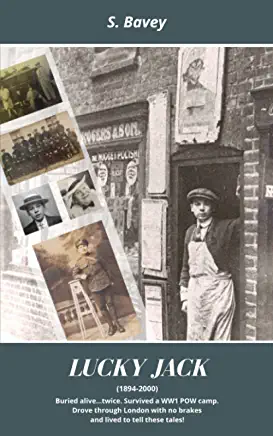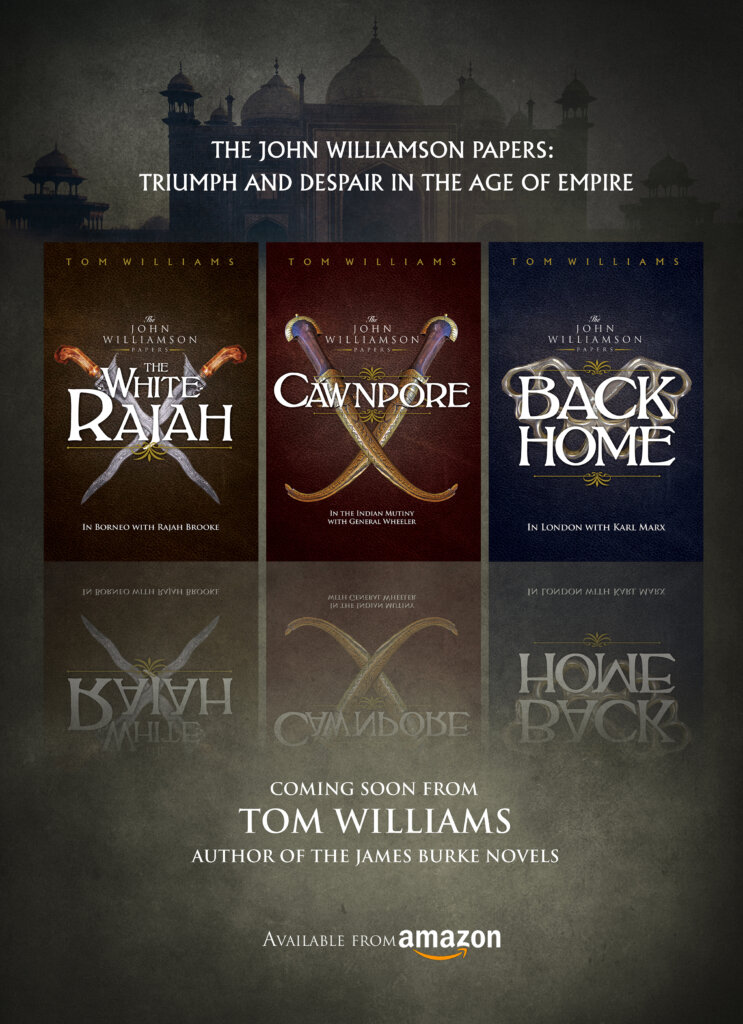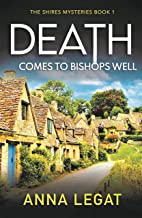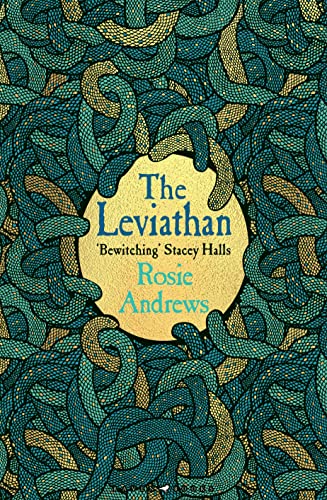
by TCW | Jan 25, 2022 | Book review
I was given a copy of this book from NetGalley. It appealed because I have been reading a few stories set around the British Civil War lately and another book in this period looked fun. The blurb mentioned a supernatural element, but I thought that might be interesting too.
I struggled with the opening. The story starts in 1703 but we are plunged straight into an account of events in 1628 which are obviously in some way supposed to relate to the rest of the book. It’s an account of a shipwreck and there are suggestions of something unnatural about it, but then we moved to the second chapter set in 1643 where a young man is returning home after a battle. Although we are soon to meet allegations of witchcraft, there is nothing as dramatic or spectacularly supernatural as the shipwreck.
We get to the shipwreck later – much, much later – but its insertion at the beginning just confused me. It seems part of a trend – presumably in response to suggestions that modern audiences have short attention spans and must have their interest piqued immediately – to putting a dramatic start to books, whether or not the story actually starts dramatically. It’s annoying. It’s particularly unfortunate as once we get to the young man returning home we find ourselves in a nicely observed account of the times. When he is faced with allegations that a servant girl is a witch, he is sceptical. In fact, much of the interest (and tension) of this part of the story comes from his trying to decide if the girl is guilty or if there is a natural explanation for the events surrounding her – a tension that is, if anything, rather undermined by the opening chapter.
The writer explores attitudes to witchcraft and how people respond to the idea that a woman might be a witch. We also see how the process can be abused by those who see possibilities for personal advantage from a witch’s fate.
Our hero is young and naïve but has to grow up fast as he navigates these difficult waters. He is helped by John Milton. It’s interesting to bring such a well-known historical figure into the story, but I felt he was rather wasted. It could have been an unknown John Smith and nothing much would have changed.
There are twists and turns to keep your interest and the whole thing is really well written. I found myself caught up in the story right to the end, but quite what happened at the end and what it all meant in the wider scheme of things was less than totally clear. Overall, I’d say that this is an entertaining read but it never lives quite up to its promise. If you’re interested in supernatural tales and life in the 17th century, it’s definitely worth a look.
The Leviathan is available on Amazon.
by TCW | Jan 11, 2022 | Book review
With Burke and the Pimpernel Affair coming out on Friday, my blog is a bit occupied with the adventures of my Napoleonic spy at the moment. That should mean waiting a few weeks for my review of Lucky Jack. I don’t want to hang about, though, as Lucky Jack is a wonderful book and deserves all the support it can get. So I am yet again reviving my Tuesday book review slot so as to get the word out. I hope you enjoy it and that it encourages you to give the book a go.
Lucky Jack
This is a “sort of a memoir”. It sits between memoir (all in the first person, much in Jack’s own words) and a biography (put together by Jack’s granddaughter, Sue Bavey).
Jack was born in 1894 and died in 2000 age 106.
Jack was, in many ways, an ordinary man, so his experiences give a fascinating picture of the changes in life between the end of the 19th century and the very beginning of the 21st.
He describes incidents throughout his life in the same way, whether it was skating on the frozen Thames as a child or living the horror of the World War I trenches.
Jack was born the year before my father (yes, my father was very old and I am no longer young) and he was brought up not that far from where I live now, so I’m constantly catching glimpses of a world I heard described by my own dad or places that I know. Reading about the early 20th century like this is a strange experience. The familiarity of much of it suggests that life has not changed that much and then you come to a detail like his baby sister being buried in the same grave as a stranger “for a small cost” and you are reminded how much was different.
The 100th anniversary of the end of World War I three years back means that we know much more about the horrors of the trenches now than we did until recently but, even so, Jack’s account brought me closer to many of the realities of life in the trenches than anything else I’ve read.
Jack’s military service was not just in France. He also served in Dublin during the Easter Rising. He does not write much about this, but it is telling that he considered his posting back to Ypres was “a relief”. Our history books are too quiet on our relations with Ireland and this tantalisingly brief glimpse of the reality of British military occupation there is revealing.
Jack was captured by the Germans in March 1918 and gives a harrowing account of his life as a prisoner of war. For some reason (perhaps because we think that the old nationalist divisions should be left to heal) we hear little about the way in which the Germans treated their prisoners. I was quite shocked.
After the war, Jack returned to England and married. There are lots of glimpses of life with his new wife. These do not contribute much to our understanding of the period, but it is these vignettes of domestic life that make Jack a three dimensional human being. He takes on the role of Everyman, guiding us through the Depression and World War II.
The years after the Second World War are not covered in so much detail. He leaves London and, soon after, his wife dies. The rest of his life recounts the move from living with his son and daughter-in-law to lodging with an elderly friend, moving into sheltered accommodation and then counting down to death with a series of grand birthday parties: his hundredth, his 104th, his 105th, and finally one quieter party to mark his 106th birthday. He died three weeks later.
I read this because Sue Bavey asked me to and I was quite nervous of taking it on. Memoirs have become quite popular lately, but I wasn’t sure I wanted to read the life story of a West London cobbler. In fact, it was fascinating. Nowadays we say that children should learn about history from the experience of ordinary people, but what is usually presented as “ordinary people” is an anodyne composite of the man or woman in the street. These sanitised figures give no real understanding of the lives of “ordinary people” while Jack’s life, I felt, gave genuine insights into what the world was like throughout the 20th century: a period of astonishing change. As my father used to point out, he had grown up over a stables, when horses were the main form of transportation but he lived to fly abroad for his holidays and eventually to watch men travel to the moon. Jack shared these experiences. Like all children, I never paid proper attention to my father’s accounts of his life. Jack has given me another chance to understand it and I am grateful.
This is a wonderful book, which I recommend wholeheartedly. It is available on Amazon: https://www.amazon.co.uk/Lucky-Jack-1894-2000-Memoirs-World/dp/B09M544DST
by TCW | Dec 10, 2021 | Book review
Last week I posted here to say that books make excellent Christmas presents. I’m not about to start recommending a list of books for Christmas, but by pure coincidence I have a couple of reviews that I need to post, so I’m going to put these up here and if the books appeal, I suggest you buy them.
The Poison Keeper: Deborah Swift
It’s difficult to write a review of a book that you feel is simply practically perfect in every way, especially when the plot contains so many twists, turns and surprises that there is hardly anything you can say that won’t include a spoiler. So here is a very short review of Deborah Swift’s The Poison Keeper. It’s set in 17th century Italy – mostly in Naples – and it follows the adventures of a young woman who is forced by circumstances to take up her mother’s trade as an apothecary. She starts reasonably enough providing remedies for minor ailments, moves on to abortifacients and, almost before she knows it, she’s providing poison for murder on a scale that makes the authorities wonder why it is that so many rich men are suddenly dying and leaving their wealth to their wives.
As I said, it’s difficult to explain why a book like this is so extraordinarily good. Perhaps it’s the convincing period detail, perhaps it’s the wonderful characterisation, perhaps it’s the moral quandaries that the characters face. Is the poisoner, in the end, any worse than a mercenary soldier? If men can use their strength and power to humiliate and subjugate women, is it legitimate for women to use a bit of pharmacology to even things up?
The story is told with Swift’s usual verve and skill and is one of those books that had me putting off things that really ought to have been done just so that I could get on to the end of the story.
We’re coming to that season when everybody has to choose their books of the year. The Poison Keeper has definitely made my shortlist.
The Paris Apartment: Lucy Foley
The Paris Apartment is being compared to books by Agatha Christie, but this is grossly misleading. Agatha Christie wrote carefully constructed detective mysteries in which the clues were made available to the reader and much of the satisfaction the books gave came from working out whodunnit. The Paris Apartment is more of a thriller. Four people share a luxurious apartment building with a conciergerie who lives in a little shed in the courtyard. Ben has been invited by an old friend to take the only empty apartment for a peppercorn rent. (We never discover why the apartment is empty, which is a minor, but real, irritation for any Agatha Christie style detective fans who want all the loose ends neatly tied off.)
Ben’s sister has invited herself to come and stay with him, but when she arrives he is missing. She sets out to solve the mystery of his having vanished.
The story is told in the first person by each of the people living in the flat (including, for a while, the apparently deceased Ben). The place obviously harbours an evil secret. We are even told that the basement used to be used by the Gestapo for torturing prisoners, which adds an appropriately macabre undertone to the story. As the story goes on, layer after layer of mystery is revealed. I’m not going to say anything else about the plot as there are many twists and turns before the denouement. I didn’t see most of them coming, but somehow they did not seem that surprising after they had happened. Possibly it’s because the whole thing is written like a jigsaw puzzle and the pieces do definitely fit neatly together, but credibility and characterisation are sacrificed to making the mechanics of the plot work.
Did I care about the people or their ultimate fate? Absolutely not. But was I curious enough keep reading? Yes. So this is a book which will pass away a wintry afternoon over the Christmas holidays and I’m sure it will make a more than acceptable gift for mystery thriller fans. Just don’t give it to anybody who really likes Agatha Christie.
Please note that I got a pre-publication copy. If you do want to give it as a Christmas present, it will have to be Christmas 2022, as it isn’t being published until March.
And don’t forget my books
Some people seem to lose count. (I do myself.) There are five books about my Napoleonic-era spy, James Burke. A sixth, Burke and the Pimpernel Affair will be published early in 2022. If you want to read more about the series, click on this link: https://tomwilliamsauthor.co.uk/james-burke-his-majestys-confidential-agent/
There are three books in the John Williamson Papers, which tackle issues of power and colonialism in the mid-19th century: https://tomwilliamsauthor.co.uk/the-john-williamson-papers-completing-the-trilogy/
I’ve also written two contemporary urban fantasies (Dark Magic and Something Wicked), which are a complete change from historical fiction. They are fun to write and fun to read. If you want to enter a world of Black Magic and vampires and (with the publication of the next one in early 2022) werewolves, do take a look.
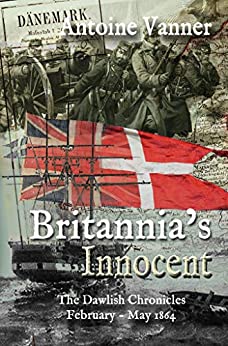
by TCW | Oct 29, 2021 | Book review
Palmerston is supposed to have said of the Schleswig-Holstein question that only three people understood it and by then one was dead, one had gone mad and he was the third and had “forgotten all about it”. I vaguely remember touching on it in school history lessons where it seemed specially designed to give school-kids headaches. So when Antoine Vanner makes the second Schleswig-Holstein war the background to Britannia’s Innocent in his Dawlish Chronicles series, he is taking something of a risk.
In fact, he explains the basis of the dispute really clearly, mainly by sketching out the key points (for example, he ignores the first Schleswig-Holstein war completely) and skipping irrelevant detail. His main point about the war (and, not being Palmerston, I’m going to take his word for it) is that it was almost entirely pointless. This allows full-rein for an extended essay on the futility and horror of much of modern warfare.
Our hero, Nicholas Dawlish, is still a young midshipman, waiting for his first posting as a Navy officer when the father of a friend of his offers him the chance to advance his career by serving on a ship that is being sent by British supporters of the Danes who are now at war against the Prussians and the Austrians. That’s a long and complicated sentence but that’s a fair reflection of this part of the plot with mysterious visitors and secret allies. The Odin is an ironclad with twin guns in a turret. She represents a break with the centuries of traditional warfare between wooden ships firing broadsides.
Vanner uses the book to illustrate different aspects of late 19th century warfare. Many of the strategic approaches developed then are still used today. The book starts with Odin engagedin commerce raiding – destroying civilian vessels sailing under Prussian or Austrian flags. Dawlish watches miserably as his captain destroys the livelihood of civilian ships’ masters, some of whom did not even know that their countries were at war, news of hostilities not having reached them before they started sailing for home.
The Odin is then ordered to Denmark where its guns should provide protection to Danish forces in a defensive position on the coast. There is much detail of the position of the force, supported by maps. Most of this passed me by but the book will appeal to the sort of people who enjoy re-fighting ancient battles and the detail provided will fascinate them. If you are not among them, it’s easily enough skipped over.
[I don’t think that the description here gives anything unexpected away, but people who are very sensitive about spoilers might prefer to read my edited review on Amazon: https://www.amazon.co.uk/review/R23UDPWPRZ7IBI.]
Dawlish is in charge of the guns as the Odin finally sails against the Austrians, opening fire on their siege works and doing some real damage. An Austrian shell, though, lands on the superstructure of the Odin which, unlike her armoured hull, is vulnerable. (Vanner is an expert on ships of this era and you certainly learn a lot about the practicalities of the naval warfare of the time.) As a result of the damage to the vessel it is unable to sail against the Austrians again until a vital part is sent from Britain.
The pause in the Odin’s operations allows Vanner to move Dawlish into the land battle. The strategy here reflects the move towards modern trench warfare. New technology, like the Prussians’ breech-loading rifles, is increasing the killing power of the soldier in the field. The sheer bloody awfulness of life in the trenches – the cold, the lice, the constant dampness, the fatigue – is well painted. Then comes the assault by the Austrians. A prolonged bombardment is followed by a mass attack of infantry. First there is shelling, then there is rifle fire, and finally the two sides are fighting hand to hand with bayonets. It is not heroic or glamorous.
The single ray of light in the darkness is the newly formed Red Cross which is kept busy treating Austrians and Danes alike. With a dreadful inevitability (given the sort of book it is) the Red Cross hospital is shelled and Red Cross doctors and nurses are amongst the dead.
After the brutal interlude of the land battle, the Odin is repaired and when the Austrians (now reinforced by Prussians) launch another assault she shells them from the sea, inflicting massive casualties. Dawlish sees it as a massacre.
“He knew already that he would regret it until the end of his life.”
There is more to come: an account of the battle of Heligoland, a real battle which the fictional Odin observes from a distance, a sub-plot involving an American Union vessel, but by now the story had run its natural course. It’s enough that Dawlish gets safely back to England and tries to put the horrors of his experiences behind him.
It’s not an easy read, though Vanner writes well. It’s the subject matter, not the prose, that wears you down. There is an awful lot in this book (the summary here has skipped over much of it) and most of it depressing. It’s true, though, that war really is hell and books that are honest about this are a valuable antidote to a lot of the romanticised versions of war that you read in so many novels. The book also shines a brilliant spotlight on the changes that were coming with the move from the warfare of the long 18th century (wooden ships, wind-power, solid shot, muskets) to the world of the US Civil War and World War I (ironclads, steam-power, explosive shells, breech-loading rifles). New tactics were developing around the new technologies. (The Battle of Heligoland was probably the last naval battle fought by ships firing in line broadside to broadside.) Vanner’s books are often built around the changes in (particularly naval) technology in this period and Britannia’s Innocent explores this theme. It’s a must-read for fans of naval history in the early years of steam.
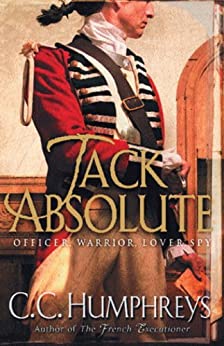
by TCW | Oct 1, 2021 | Book review
It will be a few months (probably) before the next James Burke book. Given that you’ve read all five (yes, really!) out already, you might be looking for an alternative. A series about another dashing military spy whose activities start in the late 18th century, Somebody like C C Humphreys’ Jack Absolute.
It was a really strange feeling for me, reading Jack Absolute. Absolute could be Burke’s older brother. Both are tall, slim, useful with sword and pistol, and have an eye for the ladies. Both are deeply cynical about the wars they have to fight but, in the end, are driven by patriotism to do their duty even when their duty stops them from pursuing their own pecuniary interests as much as they would like.
Burke, of course, is based on a real person whereas Absolute is based on another fictional character – the Jack Absolute of Sheridan’s The Rivals. Burke has William Brown to save him when he has got himself into a pit from which a single bound is not quite enough to free him. Absolute has Até, a Mohican Indian with a penchant for Hamlet.
Like Burke, Absolute is first and foremost a spy but he does find himself putting on a uniform and getting dragged into meticulously researched battles. While Burke is fighting the French in (mostly) Europe, Absolute’s battles are happening about 30 years earlier. He is fighting American rebels (backed by the French, of course, though they don’t actually feature in this book) during the War of Independence. There’s a lot of detail of the battle at Saratoga and Absolute spends a lot of time with General Burgoyne, so we learn plenty about the strategy of the campaign as well as the conduct of individual engagements.
Burgoyne isn’t the only historical figure to feature. Sheridan is there as well as soldiers like Benedict Arnold and the Mohawk leader Joseph Brant. There is a mass of less well-known people too, but you never get the impression that characters are being pushed into the book just so that Humphreys can show off. In fact, he wears what seems to me his considerable historical knowledge very lightly.
There is a satisfyingly evil villain (German, just to ring the changes) and a beautiful romantic interest. Humphreys writes well and I found the story bowled along fast enough for me to overlook some of the implausible coincidences. Até is kept busy arriving in the nick of time as our hero blunders into yet another disaster. I did find myself raising a critical eyebrow, but William Brown explained that that sort of thing happens in the best of novels and it is certainly a well-established trope for this genre.
There are various surprise revelations that shouldn’t come as much of a surprise if you have been paying attention, but this does have the advantage of allowing the reader to feel rather smug. And I suppose it’s reassuring to know that even a man with a brain so sharp he can look at a line of code and read it straight into English with minimal effort can fail to spot the secret agent under his nose. And, as Lee Child has observed, every hero should have one – and only one – flaw. Given Absolute’s martial skill, courage, strength, charm, and cunning, an inability to play Agatha Christie and work out whodunnit is only fair.
I found myself reading long into the night. It’s a little before my period and I know practically nothing about the American War of Independence, so it may be riddled with errors, but if it is I certainly never noticed. I was happily immersed in the 1770s and the life of a hero even more unlikely than James Burke. If you enjoy Burke, I’m confident you will enjoy Absolute. And, if you’re reading this because you have enjoyed Absolute but have never read Burke, might I suggest you will probably like him if you give the books a go?
by TCW | Aug 13, 2021 | Book review
During lockdown I had another go at reading Proust, but I’m still struggling. (The good bits are wonderful but the bad bits are like a parody of self-indulgent French intellectualism.) I’ve been given the graphic novel version of volume 1 (yes, it really exists and it’s rather wonderful) and I’m having a go at that. Meanwhile, what I’m actually reading is detective thrillers. Here are the latest (both courtesy of NetGalley)
Death comes to Bishops Well: Anna Legat
Anna Legat is already an established crime thriller writer, but my only experience of her in the past has been through her more ‘experimental’ novels, which have been interesting because of their rather edgy and sometimes nihilistic approach. I’ve seen her writing about adventures in Hell and the end of the world so I was intrigued to see what she would do in the deeply traditional ‘cosy crime’ genre.
Death comes to Bishops Well plays by all the rules. At first I was confused by having a whole heap of individuals thrown at me to sort out into potential victims, possible suspects or would-be detectives, but that more or less goes with the territory. (I enjoy Agatha Christie but I hate the obligatory dinner party at the start with ten guests who we are briefly introduced to and then have to keep track of as we try to work out which one did it.) Legat soon establishes the individual characters who are clearly drawn and interestingly three dimensional. It was the characterisation that kept me going through the initial pages while everyone was assembled together until the big party where one person ends up dead and the others are all suspects.
There’s an interesting narrative twist as chapters alternate between the point of view of a slightly fussy solicitor and his bohemian neighbour who livens up the story by seeing ghosts. The reader needn’t worry, though: the ghosts never speak or interfere with the solution of the mystery which is eventually resolved in traditional Agatha Christie style. They do add an additional layer of fun to a tale that is punctuated by regular stabs of amusement, often at the expense of twee villages like Bishops Well. (It sounds a lovely place to visit but if I had to live there I’d be desperate to be the victim in the next of what promises to be a long series.)
I’m not sure it entirely works as a crime mystery. I can’t say why without major spoilers, but I found the ending unsatisfactory. I’m not sure that Legat’s heart was entirely in finding out whodunnit. She’s much more interested in the people and the fun she can have with their situation – ghosts and all. If you go with the flow (easy enough – she writes well) you’ll have fun too.
A Slow Fire Burning: Paula Hawkins
I ‘read’ this as an audio book. I love crime thrillers on audio (how else would I get the housework done) and this definitely hit the spot.
I wasn’t sure at first. In fact I nearly gave up in the first few minutes as it started with one of those horrific ‘woman about to be raped/murdered’ prologues that linger a little too much on the misogynistic detail. I suspect Paula Hawkins may lose readers with this, which is a shame, because the book isn’t like that at all.
It’s a confusing, messy start, switching from the over-written prologue to a woman bleeding in her bathroom having been injured in some unspecified way. We quickly establish that she is a disturbed young person with unsympathetic parents and then we are away again to another woman and a detailed account of the trials of emptying the chemical toilet on her barge.
By the time we got to the murder I had almost decided not to listen to any more. I’m glad I stuck with it, though. It’s a very good (if deeply depressing) book.
It takes a while to get all the characters sorted out. What links the best-selling author and the miserable middle aged woman on the barge? And how are they linked to the alcoholic who, in turn, links us to the bloodied woman at the start of the book? And what on earth does the prologue have to do with any of it?
It is, as you may imagine, a twisted and tangled tale: twisted in both senses of the word. Almost all the characters are deeply flawed. All have some redeeming feature or, at least, some excuse for being simply awful people, but the truth is that, except for one utterly lovely person, all are very unpleasant – and one, of course, is a murderer.
To tell the truth, I didn’t really care whodunnit. I was carried along wondering how this wretched bunch of people were going to get their lives together or – more realistically – how exactly they were going to crash and burn. It’s not exactly an edifying spectacle but, like any car crash, their stories have an awful fascination.
In the end we do find out who did it. There are twists and turns along the way and the resolution is satisfying, but it’s not really crucial to the enjoyment of the book. It’s just a bloody good read – or, in my case, ‘listen’ – and Rosamund Pike’s narration is spot-on perfect.


